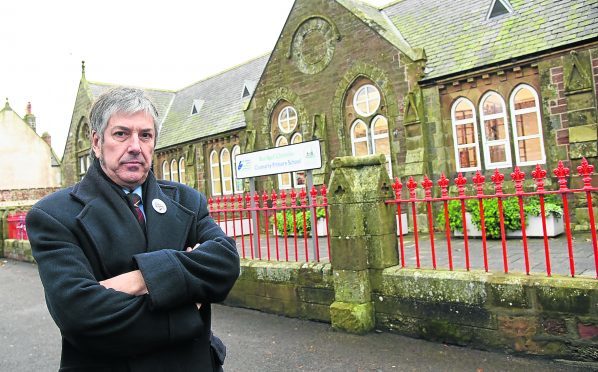A major project to revamp a Highland school finished £1million over budget and nearly six months late – prompting fears there may not be enough cash for repairs elsewhere.
Cromarty Firth Primary School’s refurbishment and extension was nearly third over the £2.75million budget due to major delays.
And an internal audit carried out by Highland Council has revealed the delays were partly due to the authority’s failure to carry out proper checks to prevent the collapse of a boundary wall during construction.
An unforeseen and abnormal discovery of rare New Zealand flatworms on site during the project’s design state was also to blame.
Stuart Black, the local authority’s director of development and infrastructure, admitted the work had been challenging but stressed the school now has a new extension which had been upgraded from a poor to an A-condition rating.
But fears are mounting among local politicians and councillors that the overspend – coupled with budget cuts – will mean there is not enough cash for other Highland schools desperately in need of repair.
Skye, Lochaber and Badenoch MSP Kate Forbes said: “This internal audit report makes for concerning reading, as it explains why the project to upgrade Cromarty Primary took so long and was a whopping £1million over budget.
“It begs the question why the problems with the boundary wall weren’t identified earlier on and the £1million could have been spent in other ways.
“I’m campaigning to see school buildings upgraded in my constituency and, in particular, Invergarry, Broadford and Banavie Primaries as well as Fortrose Academy.
“They could do a lot with £1million and it’s more than a little bit frustrating that there’s less money in already lighter coffers.”
The council carried out an internal audit of the Cromarty school project after local members raised concerns. The final report will go before the audit and scrutiny committee today.
The project, initiated in 2012, was originally meant to cost £2.75million and last 47 weeks, but instead cost £3.75million and took 72 weeks – almost a third over budget.
Building was also put on hold in May 2013 due to problems securing additional land, but eventually got under way in early 2015 before finishing last May.
The review found that whole site surveys, risk assessments and pre-start investigations were not fully performed as part of the project pre-planning process, meaning the condition and stability of the historic boundary wall was not fully assessed by the council or external consultants before work started.
It says project costs “significantly exceeded” the approved budget due to unforeseen works, extra external works and additional professional fees and contractors on costs relating to the collapsed wall.
The author of the report concluded that concerns raised by local members have now been “validated.”
Black Isle councillor Craig Fraser, who lives in Cromarty, said: “I think that level of overspend is appalling and I am lost for words.
“There’s been a lot of upheaval with staff and pupils, and we find that months later there is a significant overspend. Where was the scrutiny and where were the checks and balances that should prevent such an overspend happening?
“What are the significant overspends coming in for other projects around the Highlands? A £1million overspend would go a long way to part funding a new school, or could be used in the schools estate repair program.”
Inverness West councillor Alec Graham said that, in his own ward, contractors working on the refurbishment of Inverness High School found that more work was needed than first thought after they went on site in the summer.
Mr Graham, who sits on the environment, development and infrastructure committee, said: “The school estate (across the region) is not in the best condition but it could be significantly worse than the council thinks. Until you look completely at a building it’s not always apparent what it needs.
“The day-to-day revenue budget includes school repairs and that will certainly be under pressure. The capital programme is for new schools and major work and, similarly, there will be a lot of decisions about that.
“There is no question that the amount of work needing to be done greatly exceeds the amount of money available, so the result of that is you do the most pressing contracts first.”
